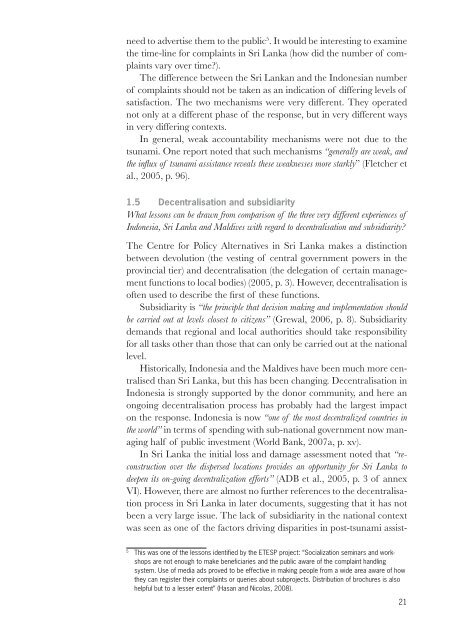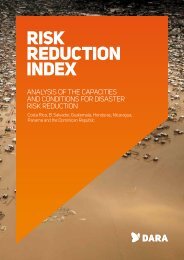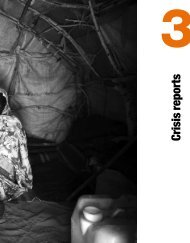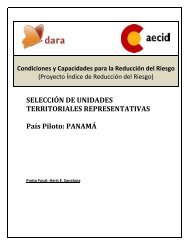- Page 1: A ripple in development?Document re
- Page 4 and 5: Authors: John Cosgrave with the ass
- Page 7 and 8: Table of contentsForeword .........
- Page 9 and 10: Acronyms and abbreviationsADBBAPELB
- Page 12 and 13: Part 1
- Page 14 and 15: ences. We have added keywords (sort
- Page 16 and 17: the document set by comparison. The
- Page 18 and 19: disasters (Amin and Goldstein, 2008
- Page 20 and 21: sages that led to needless deaths (
- Page 24 and 25: ance in Sri Lanka (Grewal, 2006, p.
- Page 26 and 27: to 15% by 2005, partly due to the i
- Page 28 and 29: 2. Poverty, livelihoods andeconomic
- Page 30 and 31: 2.3 Relative importance of external
- Page 32 and 33: In Sri Lanka , the continuing confl
- Page 34 and 35: 3. Rebuilding the social fabricand
- Page 36 and 37: One report stated that with strong
- Page 38 and 39: 4.2 Window of opportunityDid the ts
- Page 40 and 41: Christoplos (2006, pp. 69-70) discu
- Page 42 and 43: tions (Global Network of NGOs for D
- Page 44 and 45: 5. Capacity developmentThematic sco
- Page 46 and 47: With pressure decreasing during the
- Page 48 and 49: ADB , Japan Bank for International
- Page 50 and 51: Cardon, S., Davies, A., & Senga, A.
- Page 52 and 53: Global Network of NGOs for Disaster
- Page 54 and 55: Koser, K., & Van Hear, N. (2003). A
- Page 56 and 57: Oxfam International. (2008). Oxfam
- Page 58 and 59: UNDP . (2007). Analysis Report: Ben
- Page 60 and 61: Wood, B., Kabell, D., Muwanga, N.,
- Page 62 and 63: Part 2
- Page 64 and 65: 4. Abarquez, I., & Murshed, Z. (200
- Page 66 and 67: organisations and their discussions
- Page 68 and 69: disaster, the tsunami was unparalle
- Page 70 and 71: effectiveness, governance, and disa
- Page 72 and 73:
70(15%), manufacturing (8%) and fi
- Page 74 and 75:
ecovery phases following the relief
- Page 76 and 77:
29.30.Aeberhard, P. (2008). Expecta
- Page 78 and 79:
34.org/wp-content/uploads/rpt_tsuna
- Page 80 and 81:
38.assesses a further set of 30 rep
- Page 82 and 83:
80mechanisms. These overviews are p
- Page 84 and 85:
DB582DDA-A22B-49BE-ADE3-E70ED6D2B41
- Page 86 and 87:
51.52.84policies and programs to al
- Page 88 and 89:
and skills. The Australian Governme
- Page 90 and 91:
88accountability; future; NGOs; pro
- Page 92 and 93:
65.Notes: This is one of the fi nan
- Page 94 and 95:
Keywords: damage; Aceh; housing; di
- Page 96 and 97:
72.73.With additional stake-holder
- Page 98 and 99:
76.evaluation; results; coordinatio
- Page 100 and 101:
etter recovery potential of househo
- Page 102 and 103:
85.86.managing the grant expenditur
- Page 104 and 105:
89. Briceño, S. (2005). Ten lesson
- Page 106 and 107:
94.agencies. The critical learning
- Page 108 and 109:
Notes: The primary objective of thi
- Page 110 and 111:
8apr.pdf/$File/icva-idn-8apr.pdf.No
- Page 112 and 113:
106. Centre for National Operations
- Page 114 and 115:
111.112.http://www.cpalanka.org/res
- Page 116 and 117:
and with other NGOs such as the Red
- Page 118 and 119:
and assess their role in the medium
- Page 120 and 121:
places on the aid agencies. As note
- Page 122 and 123:
120drive for greater “effi ciency
- Page 124 and 125:
129.130.131.sediments. Random augur
- Page 126 and 127:
Keywords: impact; population; GDP;
- Page 128 and 129:
138.17 NGOs (Non-Governmental Organ
- Page 130 and 131:
measures to building up capacity in
- Page 132 and 133:
Keywords: UN; disaster; flood; plan
- Page 134 and 135:
year’s progress justice. In terms
- Page 136 and 137:
9,635 individuals. Of the original
- Page 138 and 139:
to give these away. Giving circles
- Page 140 and 141:
December 2004. In the course of our
- Page 142 and 143:
of sediments at their outlets to th
- Page 144 and 145:
171. FAO. (2007). Real Time Evaluat
- Page 146 and 147:
176. Fengler, W., Clark, J., Cibuls
- Page 148 and 149:
146related to these disasters: 1 of
- Page 150 and 151:
148150 NGOs in Sri Lanka. The affec
- Page 152 and 153:
in Aceh province, Indonesia has thr
- Page 154 and 155:
152org/NR/rdonlyres/66696E7D-6C7C-4
- Page 156 and 157:
154risk reduction. A fi rst publica
- Page 158 and 159:
156Sphere; authority; India; govern
- Page 160 and 161:
Notes: Some 80 people, including go
- Page 162 and 163:
Republic of the Maldives. Male: Gov
- Page 164 and 165:
220. Goyder, H., Girerd-Barclay, E.
- Page 166 and 167:
org/NR/rdonlyres/5088F429-187E-4C21
- Page 168 and 169:
227.emergency response, decreased b
- Page 170 and 171:
230.231.and coral reef lagoons, dev
- Page 172 and 173:
170Notes: Working Paper on how the
- Page 174 and 175:
238. HelpAge International. (2006).
- Page 176 and 177:
174community; quality; disaster; be
- Page 178 and 179:
249. Human Rights Commission of the
- Page 180 and 181:
252. Huxley, T. (2005). The tsunami
- Page 182 and 183:
Notes: When local elections were he
- Page 184 and 185:
261. ICMH. (2005). Interim Report o
- Page 186 and 187:
267. IFRC. (2007). Tsunami three-ye
- Page 188 and 189:
of past tsunami behaviour that was
- Page 190 and 191:
(50%), water - 15% will remain with
- Page 192 and 193:
Maerkte/Tsunami_Bericht_Indonesien.
- Page 194 and 195:
Notes: This study employed both a q
- Page 196 and 197:
194government; planning; economic;
- Page 198 and 199:
countries in the region in developi
- Page 200 and 201:
293. Jayasuriya, S., Steele, P., &
- Page 202 and 203:
the province on 26 December 2004. D
- Page 204 and 205:
202is quite a traditional one. The
- Page 206 and 207:
305. Lankester, T., & Hendytio, M.
- Page 208 and 209:
content/bsc/cbi/2005/00000019/00000
- Page 210 and 211:
obust to the infl uence of outliers
- Page 212 and 213:
210to disaster and an important sur
- Page 214 and 215:
addresses the socio-technical persp
- Page 216 and 217:
extent of the damage and the amount
- Page 218 and 219:
issues of identity, resource entitl
- Page 220 and 221:
environmental sustainability. As a
- Page 222 and 223:
220are required to make high conseq
- Page 224 and 225:
esults; risk; disaster; local; info
- Page 226 and 227:
345.346.35. Last viewed on 20 Octob
- Page 228 and 229:
Notes: This report highlights the m
- Page 230 and 231:
353.354.Nishikiori, N., Abe, T., Co
- Page 232 and 233:
230published in 2003, which highlig
- Page 234 and 235:
361. O’Donnell, I., & Kakande, C.
- Page 236 and 237:
under the direction of the Sector L
- Page 238 and 239:
236dataoecd/32/60/35051857.pdf.Note
- Page 240 and 241:
374. Olken, B. A. (2007). Monitorin
- Page 242 and 243:
December 2003 has received only US$
- Page 244 and 245:
242to security concerns. Under-spen
- Page 246 and 247:
DOCUMENT/tsunamis_05/indonesia/live
- Page 248 and 249:
of redevelopment to ensure sustaina
- Page 250 and 251:
248over the last three decades. Thi
- Page 252 and 253:
400.that has been documented since
- Page 254 and 255:
403. Plan International. (2006). Ts
- Page 256 and 257:
254which the experiences of the loc
- Page 258 and 259:
256rehabilitation; society; humanit
- Page 260 and 261:
423.424.Offi cer, Shelter Specialis
- Page 262 and 263:
tlp_full-report.pdf.Notes: Natural
- Page 264 and 265:
A1C8F70F1F13/0/government_funding_c
- Page 266 and 267:
437.humanitarianinfo.org/agricultur
- Page 268 and 269:
266Keywords: capacity; local; respo
- Page 270 and 271:
444. Seree, & Montri, K. (2006). Fu
- Page 272 and 273:
448. Sida, L., Alexander, J., Allai
- Page 274 and 275:
Notes: This thesis outlines researc
- Page 276 and 277:
26, 2004 as an example to highlight
- Page 278 and 279:
276training; family; NGOs; health;
- Page 280 and 281:
469.470.norms or standards, but non
- Page 282 and 283:
exacerbate the pre-existing economi
- Page 284 and 285:
282from Country Experiences (pp. 29
- Page 286 and 287:
UN, BRR, & Pancacita. (2008).482. T
- Page 288 and 289:
ecovery is developed. The document
- Page 290 and 291:
288pdf.Notes: This report lists a n
- Page 292 and 293:
494. UNDP. (2008). Human Developmen
- Page 294 and 295:
498. UNDP Community Initiatives Uni
- Page 296 and 297:
294work is ongoing to restore repro
- Page 298 and 299:
2008. URL: http://www.unicef.org/me
- Page 300 and 301:
Keywords: disaster; government; nat
- Page 302 and 303:
520. University of Colombo. (2006).
- Page 304 and 305:
evaluation of the work of the UK’
- Page 306 and 307:
530. Vijayakumar, L., & Suresh Kuma
- Page 308 and 309:
306success: the tsunami and recover
- Page 310 and 311:
(GAM) GAM-GoI incidents continue to
- Page 312 and 313:
310_20070809124438/Rendered/PDF/404
- Page 314 and 315:
312Keywords: conflict; Aceh; local;
- Page 316 and 317:
314Tenggara (see previous Updates),
- Page 318 and 319:
WDSContentServer/WDSP/IB/2007/08/10
- Page 320 and 321:
318Notes: The situation in Aceh rem
- Page 322 and 323:
568. WFP. (2005). Synthesis Review
- Page 324 and 325:
574. WFP. (2008). Budget Revision W
- Page 326 and 327:
579. WHO. (2005). WHO’s Response
- Page 328 and 329:
583. Wikipedia. (2006). Countries a
- Page 330 and 331:
These evaluations looked at actual
- Page 332 and 333:
330to examples primarily from Indon
- Page 334 and 335:
Keywords: Sri Lanka; GDP; poverty;
- Page 336 and 337:
602. World Bank IEG. (2006). Hazard
- Page 338 and 339:
336Notes: This paper studies the ro
- Page 340 and 341:
338dx.doi.org/10.1016/j.puhe.2008.0
- Page 342 and 343:
Africa, 12, 75, 105, 133, 147, 206,
- Page 344 and 345:
344, 409, 436, 444, 455, 471, 472,
- Page 346 and 347:
conditionality, 315conflict, 5, 37,
- Page 348 and 349:
dialogue, 20, 21, 40, 95, 143, 201,
- Page 350 and 351:
education, 5, 7, 9, 14, 15, 17, 19,
- Page 352 and 353:
364, 372, 379, 381, 382, 384, 386,
- Page 354 and 355:
groups, 4, 5, 8, 9, 11, 27, 32, 33,
- Page 356 and 357:
229, 230, 233, 237, 247, 250, 253,
- Page 358 and 359:
joint, 1, 24, 25, 47, 59, 76, 79, 9
- Page 360 and 361:
malnutrition, 147, 220, 482, 570, 5
- Page 362 and 363:
334, 339, 346, 348, 359, 361, 368,
- Page 364 and 365:
preparedness, 2, 10, 14, 16, 18, 21
- Page 366 and 367:
ehabilitation, 11, 16, 17, 19, 23,
- Page 368 and 369:
Sigli, 138Simeulue, 282, 320, 482,
- Page 370 and 371:
Tafren, 24, 411Tamil, 5, 8, 24, 25,
- Page 372:
561, 563, 564, 566, 601, 604volunte














